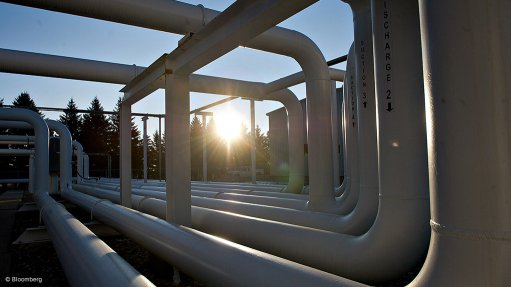
Photo by: Bloomberg
VANCOUVER (miningweekly.com) – Canada’s independent energy regulator has approved construction of an 11.7 km natural gas pipeline in Vaughan, Ontario, subject to 19 conditions.
TransCanada Pipelines’ Vaughan Mainline expansion project would be integrated into the company’s existing mainline system and its King’s north connection pipeline.
The National Energy Board’s (NEB’s) letter of decision followed a public hearing process started on February 10, during which 17 intervenors and five commenters were given the chance to participate.
Intervenors proposed a number of conditions during final argument, some of which related to changes to the proposed and revised route, which the board rejected.
The NEB’s written reasons would be published on or before September 9.
ENERGY EAST
Meanwhile, the NEB is preparing for its first of ten public hearings on TransCanada’s Energy East pipeline project starting Monday in Saint John, New Brunswick. The panel would host sessions along the pipeline’s proposed route in New Brunswick, Quebec, Ontario, Manitoba, Saskatchewan and Alberta.
The session in Saint John was scheduled to run until Wednesday, with the second New Brunswick session starting on Monday, August 15, in Fredericton.
The Energy East hearing would include several opportunities for hearing participants to provide input, including panel sessions, written submissions, oral cross-examination and final argument.
Complementing the hearing, the comprehensive Energy East review process would include expanded public engagement activities to be carried out by other board members who will report relevant findings to the panel, the NEB advised.
Environment and Climate Change Canada (ECCC) would also assess the upstream greenhouse gas emissions associated with this project. The NEB and ECCC were working on an enhanced public engagement process for this assessment.
The 4 600 km Energy East pipeline project will transport 1.1-million barrels of crude oil a day from receipt points in Alberta and Saskatchewan to Saint John, in New Brunswick, with additional delivery points in Montreal and the Quebec City region.
The plan is to convert about 3 000 km of TransCanada’s existing Canadian Mainline natural gas system into an oil service and build up to 1 600 km of new pipeline to transport crude oil.
The project involves three significant components. Energy East will convert an existing natural gas pipeline into an oil service between Burstall, in Saskatchewan, and Cornwall, in Ontario. New sections of pipeline will also need to be built in Alberta, Saskatchewan, Manitoba, Eastern Ontario, Quebec and New Brunswick to link up with the newly converted pipe.
The project will also require associated facilities, such as pumpstations, tank terminals and marine facilities, to successfully transport the crude oil from Alberta to New Brunswick and access new markets.
The pipeline will include four oil tank terminals, 65 to 70 pumpstations and two marine-tanker loading facilities.
The pipeline will terminate at Canaport in Saint John, New Brunswick.